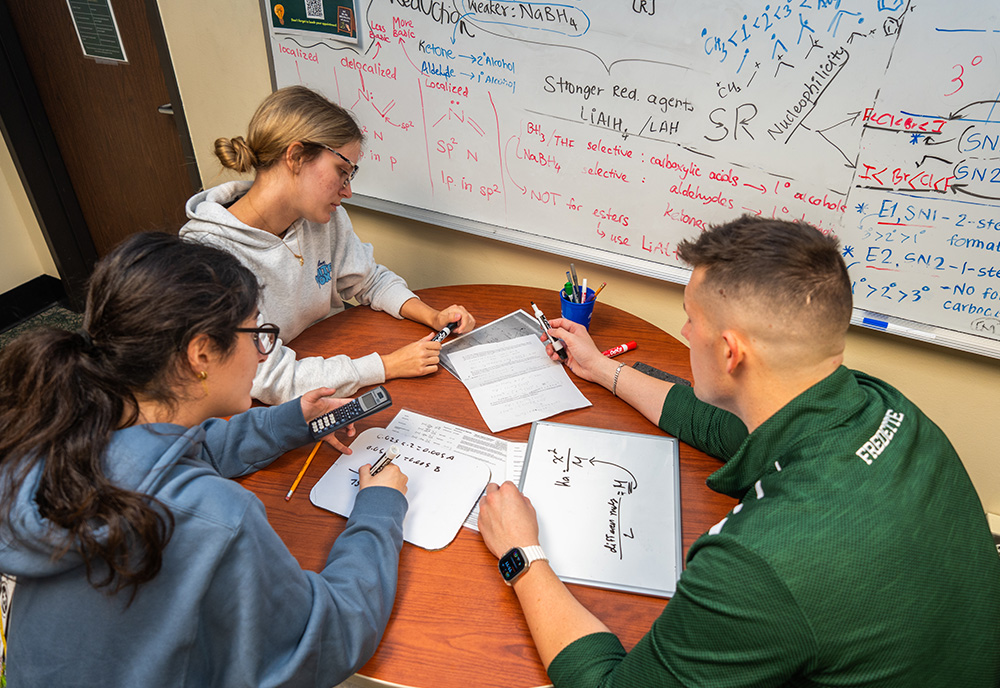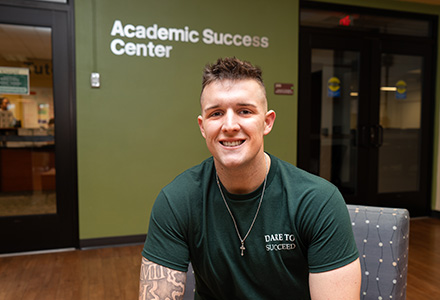By John Dudley, University Communications and Marketing
A record number of students are benefiting from the USF Academic Success Center since it significantly started expanding its services throughout the past year.
Year-over-year utilization of the center, which provides access to tutoring and writing support, was up 75% during the 2023-24 academic year compared to the prior year – thanks to a series of changes that ASC Director Zoraya Betancourt calls “transformative.”
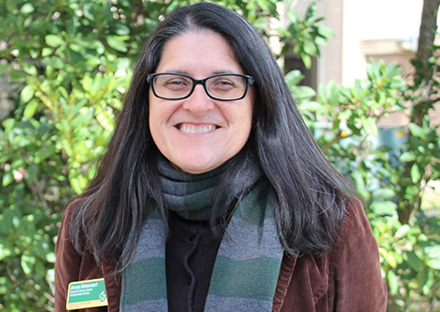
Academic Success Center Director Zoraya Betancourt
The changes include reorganizing staff to put more practitioners in student-serving roles and adopting a case management approach in collaboration with USF’s highly successful Office of Academic Advocacy.
“After COVID-19, we weren’t sure how quickly students would return to in-person services,” Betancourt said. “We’ve invested heavily in hiring and revisiting our approach to ensure students have all the resources they need, academically and even socially, as they settle into college life.”
A cornerstone of the revamped center is a new care management model that provides tailored support for not only academic mentoring and tutoring, but also non-academic issues students may face, especially those experiencing on-campus learning for the first time.

Academic Services Administrator Larry Billue Jr.
“The benefit of the model is that it has allowed us to assist students who were lost or felt helpless while dealing with the number of different situations in their life,” said Academic Services Administrator Larry Billue Jr., the center’s point person for care management initiatives.
The approach enables the center’s practitioners to work at a pace that matches students’ needs and make referrals to other resources across campus, including the Office of Academic Advocacy.
“If our conversation takes three hours, it takes three hours,” Billue said of meetings with students. “If it means helping them for my entire workday, then so be it. The model is also beneficial to our student staff and has led to a better bond between them and the administrators. They feel they are cared for and seen for their individuality.”
In addition to care management, the center’s enhanced services also include:
- Academic Peer Mentors, who meet face-to-face or online with students to provide individualized advice on topics such as time management, organization, test preparation, motivation, academic and career exploration and involvement with campus groups and activities.
- Book-A-Tutor, which provides personalized in-person tutoring for all currently enrolled USF undergraduate students. The service enables students to schedule one-on-one sessions with trained USF peer tutors in various STEM subjects, with group appointments available on request.
- Write-A-Bull, part of the center’s Writing Studio, which offers free online, asynchronous writing assistance. Students can submit their documents and receive written feedback from tutors.
- Peer Assisted Study Sessions, providing voluntary, informal out-of-class group meetings led by trained student leaders that include collaborative work and activities. PASS leaders are jointly selected by Academic Success Center staff and course faculty, and they focus on materials that are relevant to students and share tips and advice on studying and maximizing their potential.
- The PORTAL (Peer Online Resources for Tutoring and Learning), is a new initiative focused on
meeting students’ learning needs outside of the ASC’s traditional hours of operation.
The service provides one-on-one online peer tutoring sessions and teams with faculty
to create learning resources that are easily accessible through the ASC website.
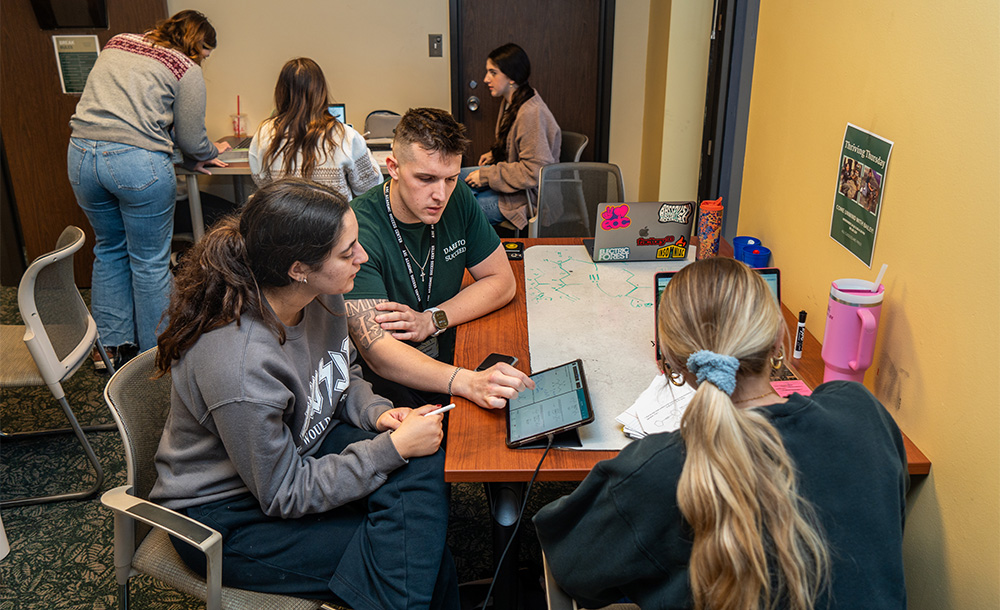
Support that adapts to individual student needs
Students who visit the center and staff who work there agree that the investment is already paying dividends.
Anthony Olguin Donu is a philosophy major from St. Petersburg who scheduled a meeting with an academic peer mentor when he had trouble balancing coursework and began falling behind on assignments.
“She gave me advice on how to move forward by taking baby steps to find the root of my academic issues,” Olguin Donu said. “She helped me learn to not overwhelm myself and to communicate with my instructors about what I've been dealing with.”
Because the center’s academic peer mentoring is individualized, mentors can adapt support to the needs of each student.
Isabelle Cavazos, a learning and development facilitator at the Academic Success Center since May 2023, supervises a mentor who began meeting with a neurodivergent student last spring to provide note-taking strategies. Neurodivergence includes conditions such as autism spectrum disorder, attention-deficit hyperactivity disorder and obsessive-compulsive disorder.
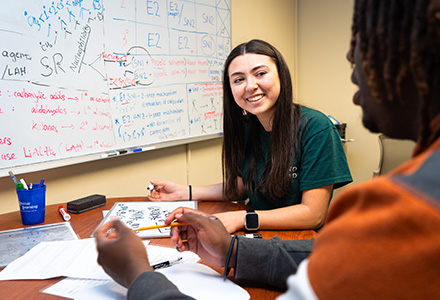
Academic Success Center tutor Jessica Lospenuso
Over time, the mentor developed an understanding of how the student learned and worked with them to create systems for their approach to studying.
“As they established a strong mentoring relationship, the student also shared insight on the personal circumstances impacting their academics,” Cavazos said. “The mentor offered guidance, support and connection to campus resources.”
In some cases, students who have received support from the center end up coming back to pay forward their positive experiences.
After struggling with chemistry in high school, Jessica Lospenuso sought tutoring help from the center early in her college career. The experience inspired her to become a tutor herself. She graduated in December with a biomedical sciences degree and is preparing to apply to medical schools.
“I had seen firsthand how the tutors boosted my confidence in a subject I once feared. I wanted to help other students achieve that same feeling and motivate them to persevere in a difficult subject like I had done before.”
Jessica Lospenuso
Academic Success Center tutor
Another ASC tutor, Michael Fredette, similarly began working for the center after accessing services shortly after he enrolled at USF. He said his own experience struggling with coursework helped him learn how to break down complex subjects for others.
“I love watching people learn, and I love watching light bulbs go off in people's heads,” said Fredette, who graduated in December and is headed to Alabama College of Medicine. “They come in stressed, and they leave confident. And I love that so much.”
Increased staffing and a data-informed approach
Academic Success Center tutor Michael Fredette
To meet increased demand, the center has strategically refined its practices and expanded from four full-time staff to seven, with an eighth staff member scheduled to join the team in May.
“Before, we were more top-heavy from a staffing perspective,” Betancourt said. “We re-organized so that now we have a director and an assistant director with more practitioners reporting to them who directly serve our students.”
The changes allow full-time staff to have more direct daily contact with student employees, including more than 80 peer student assistants, tutors, mentors and study session leaders. The personalized approach strengthens professional development initiatives such as training and employee mentoring and improves the working experience for student staff.
The center also uses data collected on students’ majors, colleges and how they utilize services to identify high-demand subjects and make decisions on when to schedule learning support.
A new report compiling visitor information enables Betancourt and her team to conduct personalized outreach to welcome new students and introduce them to the center’s services. Data fed into a newly created dashboard helps track how Academic Success Center services are impacting student retention.
Betancourt worked closely with Steve Johnson, a data scientist with USF’s Predictive Analytics Research for Student Success team, sharing her vision for the dashboard and the challenges her team faced in obtaining data.
“She was highly collaborative as we iterated on initial design concepts,” Johnson said. “As the builder, it’s extremely satisfying seeing a tool such as this being successfully implemented – and even better, seeing the impact of the strategies and practices in the data.”
Taken together, the enhancements will help Academic Success Center staff monitor utilization trends closely, ensuring that it can adapt to future shifts in student demand. The center works in partnership with learning centers at USF’s St. Petersburg and Sarasota-Manatee campuses to ensure a seamless learning experience for all USF students.
Betancourt noted that the increased demand for services initially came as a surprise. But after hearing from colleagues at other institutions, she learned that USF’s experience aligns with trends being observed at universities nationwide.
“There’s a clear shift underway in higher education as institutions realize that helping students thrive requires a more integrated approach that goes beyond traditional academic support,” Betancourt said. “It’s an example of the small ways we can make students at a big university feel at home in the campus community.”
